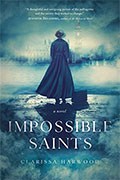Impossible Saints
Clarissa Harwood
book reviews:
· general fiction
· chick lit/romance
· sci-fi/fantasy
· graphic novels
· nonfiction
· audio books
· author interviews
· children's books @
curledupkids.com
· DVD reviews @
curledupdvd.com
newsletter
win books
buy online
links
home
for authors
& publishers
for reviewers

 |
Impossible Saints Clarissa Harwood Pegasus Hardcover 304 pages January 2018 |
|
In Impossible Saints
Lilia asks childhood friend Paul Harris--a Canon at St John's Cathedral--to come with them. Lilia doesn't expect Paul to challenge her views about women and men and the right to vote in such a direct way. Paul sees her as someone worth sparring with, especially when it involves having to defend her way of life. Paul has never thought of Lilia as a family friend, "only as a wild little genius girl," a part of his past. A brilliant scholar, Paul has fond memories of his mother, Bianca, before she betrayed his father by running off to live with her lover in Ingleford. At the same time, Paul realizes that he's furtively attracted to Lilia. Lilia finds Paul charming, but they clash over the people and ideas surrounding women's suffrage, an issue that Paul seems to know nothing about. Lilia, Paul, Harriet, and Harriet's close friend Lady Fernham stand before the stark gray stone walls of the Whitechapel House of Mercy. Paul has serious misgivings; he desires to protect Lilia from Mary Braddock, one of the wicked abandoned creatures that many of his colleagues speak out against. More concerning is Lilia's talk of contraception, a word Paul would never hear from "the lips of a respectable unmarried woman." Like most people, he associates it with prostitution. He's amazed that Lilia has already shown that she knows more about these things than a well brought-up young lady should. Impossible Saints A daring and desperate move (somewhat convenient, dramatically speaking) is to set Lilia and Paul's story firmly athwart the famous Parliamentary Square demonstration. Paul is appalled at the stories from the newspapers that dwell upon the sensational details, dismissing the suffragettes as hysterical madwomen, "unnatural women" whose disordered minds can think of nothing but votes and equality with men. In alternating chapters, Lilia and Paul's individual voices come alive, heightening the delicate interplay between the social, sexual, and spiritual politics of the period. Events in the novel move pretty quickly after Lady Fernham tells Lilia she's an inspiring leader and she would like to see her in a position of where she could influence the decision-makers in the country more directly. The drama comes from Lilia and Paul's deeply rooted desire for each other as well as from the exigencies of plot. The suffragette movement proves to be unstoppable, a vibrant and creative force intent on changing every facet of women's lives. Although the story has a high romance factor, it's still a surprise that the novel culminates in Lilia's attempts to use all her powers of persuasion to convince the older women of the importance of upholding the WSPU mandate. Central is Lilia's inability to deny that she loves Paul, which in turn gives Paul a brief spark of hope, despite Lilia's decision to leave him alone back in bucolic Ingleford, if only for a time. Originally published on Curled Up With A Good Book at www.curledup.com. © Michael Leonard, 2018 |
| Also by Clarissa Harwood: |
|
|
|
 Click here to learn more about this month's sponsor! |
|
| fiction · sf/f · comic books · nonfiction · audio newsletter · free book contest · buy books online review index · links · · authors & publishers reviewers |
|
| site by ELBO Computing Resources, Inc. | |
 This is a time of immense change in England, a slow decline of a patriarchal society. When Lilia's headmaster father, a phlegmatic sort of peacemaker, sacks her from Ingleford's simple village school, Lilia finds herself in an untenable situation. She moves to London where she begins teaching at a school founded by her friend Harriet Firth. A member of the National Union of Women's Suffrage, Harriet tells Lilia about Ellen Wells, a working-class inmate at the Whitechapel House of Mercy who has spent much of her life on the streets as a prostitute. Lilia and Harriet decide to visit the penitentiary, the charitable institution that houses many of London's so-called "fallen women."
This is a time of immense change in England, a slow decline of a patriarchal society. When Lilia's headmaster father, a phlegmatic sort of peacemaker, sacks her from Ingleford's simple village school, Lilia finds herself in an untenable situation. She moves to London where she begins teaching at a school founded by her friend Harriet Firth. A member of the National Union of Women's Suffrage, Harriet tells Lilia about Ellen Wells, a working-class inmate at the Whitechapel House of Mercy who has spent much of her life on the streets as a prostitute. Lilia and Harriet decide to visit the penitentiary, the charitable institution that houses many of London's so-called "fallen women."